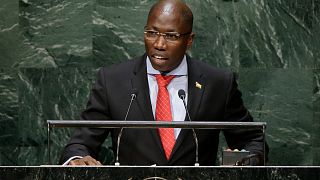Zimbabwe
Zimbabwe may use Treasury bills and enforce a land levy to compensate white farmers whose land was seized during a widespread redistribution programme.
This is according to the country’s Finance Minister Patrick Chinamasa, who said the government needs to raise funds to pay out white settlers for both land and self-improvement as well as equipment acquired from them.
Nevertheless, the government still has to factor how much should be put into the compensation fund.
#Zimbabwe Says It Plans T-Bill Issue to Compensate White Farmers https://t.co/AYXDiPhBV2
— Bloomberg Africa (@BBGAfrica) April 1, 2016
“Just knowledge of that amount will help tremendously in deciding which way to go. I don’t think we can start talking now about which way to go either left or right or forward unless we know the figure. Once we know the figure then I think that we then enter into the next round of discussions, which is, what are the modalities for payment and to that I am committed and government is committed,” said Chinamasa who was addressing farmers, western ambassadors and non-governmental organisations.
The Southern African country begun to forcefully evict white farmers under veteran President Robert Mugabe’s directive which started in 2000.
However, the government has settled 240 white settlers from an estimated 6,000 farms.
“Land is just taken away from you and people move on, on a daily basis and you got no recourse to the law and that there has been no compensation coming forward… I think today is quite significant as for me its a start of a process here and l hope to see the outcome of this workshop,” said Gilbert Lourie, an evicted farmer.
President Mugabe had previously vowed not to compensate white farmers as the land belongs to the black community. He claimed on several occasions that the land was stolen during colonial rule.
Despite Mugabe’s change of heart to pay the farmers, the new farm occupants are against the settlement programme.
“I have got a problem with that. This is akin to government disempowering its own people, because if you give back the land to the people, you don’t tax the people in order to pay the thief who stole the land yesterday,” said farmer, Edward Tome.
The Southern African country has been in an economic meltdown since 2000 and has struggled to gain a footing in the agricultural sector, once a pivotal source to the country’s Gross Domestic Product.













11:16
DRC: Stability on paper, Mining rush in reality? [Business Africa]
01:02
Pix of the Day: July 24, 2025
Go to video
Zimbabwe court rejects opposition bid to block Gukurahundi massacre hearings
02:19
South African actor Embeth Davidtz makes directorial debut with Rhodesia-set drama
01:47
New International Olympic Committee president Kirsty Coventry faces high expectations
02:06
Zimbabwe: Yoga in a tavern is the latest mental health outreach